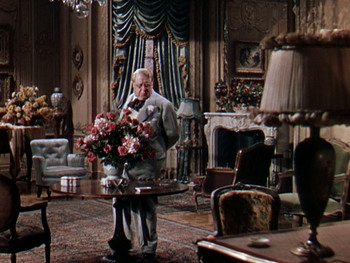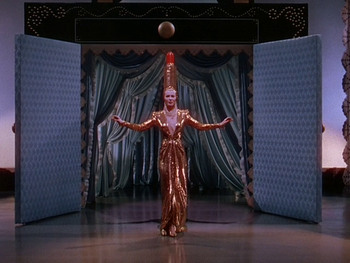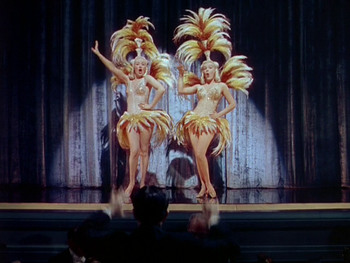Some films I watched over the last few days and ended up writing something about.
Zhuang si le yi zhi yang AKA Jinpa (2018, Pema Tseden)

At first glance, Jinpa is all about the "look". It is deliciously lit, with the frames emitting pure heat. There is limited dialogue, limited action - and a spiked haired protagonist who essentially never removes his sunglasses. The type of cool, no-nonsense look that would have fit in perfectly in a Takashi Miike film 20 years ago - but no, this is not that kind of a film. Jinpa is actually a slow, brooding, lyrical and - as it becomes clearer and clearer, philosophical film about choices, connections and thoughts - as paths emerge into one. 8/10
Lyrisch nitraat / Lyrical Nitrate (1991, Peter Delpeut)

This is a perfectly solid meditation of cinema by merging together elements of the remnants of a large library of nitrate film stock that has mostly been destroyed. However, to be honest I was a little underwhelmed here. Given the introduction stating how destroyed the negatives were, I was expecting to see new poetry and beauty created from this damage (there is an element of this towards the end) but the majority is using well-preserved stock - and playing many scenes out.
I like the added meta context, in seeing star after star - as if they were all in the same film - and then title after title - all framed against footage of spectators in a cinema - before we venture out into the world. It was also nice to see how scenes from what is clearly average melodramas to be given added gravitas and stand out in their next context. A perfectly pleasant exercise. 6/10
Double Labyrinthe (1976, Maria Klonaris, Katerina Thomadaki)

Honestly, this film did not speak to me much - though certain visuals are intriguing. We mainly look at blood, nude bodies and blood dripping from or on nude bodies - with the interjected meet, skull, stabbing, etc. There is no sound, and the experience feel campy, but not campy enough to be genuinely amusing/absorbing. 4/10
Le sang (1971, Jean-Daniel Pollett)

Avant-garde theatre is its most bizarre form - we see people walking, running, fighting, murdering along a seemingly endless path - without any direction in sight. Shouting, screeching, grunting - taking up most interaction - with the occasional lines of dialogue that usually feel more like live poetry. Brutal, frantic and "free" this almost religious gathering, filled with iconography, starts and ends with blood - and a wheel that may or may not keep turning.
In some ways, it is a hard film to watch, especially as there may be genuine animal deaths on screen. Be warned! And while this did place a (potential?) bad taste in my mouth this is simply an incredible journey to watch.
It is not stated in the film itself, but it is a recreation of "the living theatre" which existed in the 40s and onwards - and is meant as a meditation on freedom. This is very much felt. It feels both free and confined at the same time, wrapping itself in horror, circles, lines and madness. 9/10
L'ordre (1973, Jean-Daniel Pollett)

I have mixed feelings about L'ordre. The actual interview so much centres around and returns to - with the unforgettable image of a man who's face has been ravaged by leprosy - carries an incredible amount of strength.
However, the experimental element - that is the footage of the place he - and others afflicted by leprosy used to live - feels thin. We get a line early on, where he says so many people have come and documented their experience and everyone just uses them for their own aim. It kinda feels like this is what Pollet is doing when he just takes his camera to go in and out a window (on repeat) or just runs down a hall.
At the same time, it does feel like strong and beautiful contemplation on the illness, the history and the real experience of those afflicted with it. Centring it within the walls they lived - and asking questions of whether or not locking them away actually gave them more freedom, is powerful and interesting - I just can't decide to which degree it is self-indulgent, and to which degree this fits the actual mood/experience presented. 7.5/10
Sink or Swim (1990, Su Friedrich)

A beautiful and stripped back tale of growing up - narrated to juxtaposed, black and white footage, that is frequently stunning. We follow the story of a young girl (possibly Friedrich herself) and her relationship to her father. It is told in the form of "The girl", later "The woman" and "The girl's father" - and it has a poetic and very visceral force of resonance, even with the abstractions. The stories are clear and touching, while the images, staring with conception and wonderful footage of a fetus, takes us on her journey - as the images bring the tale to life. 8/10
Jonaki (2018, Aditya Vikram Sengupta)

Jonaki very much captures the feeling of a wasteland, a unique world crumbling on top of itself, disappearing - my mind drifts to Sukorov, and his more experimental work. The visuals are beautiful, but also a little vacant.
I will say though, that there is a resonating conflict, revealed at the end, that does make what we have seen come together more than you'd originally think. At face value this is a world where people turn into trees, and fruit covers corridors. The poetic exit does centre the film a little more, and offers a key.
At the same time, while I was swept up in its beauty, I don't think it held itself together as well as it should - mixing contemplation/poetry - with the odd, minimalist almost reverse-Tetsuo vibe. I simply did not find this seemingly central theme or its execution that satisfying - though it is at all times an enjoyable film, and, with its conclusion comes together quite well. 7/10.
Jesus Shows You the Way to the Highway (2019, Miguel Llansó)

Jesus Shows You the Way to the Highway is clearly a future cult movie phenomenon - as bizarre and off-beat as it is playful and fun - complete with video game/simulation tie-ins giving the impression of a retro-Matrix/World on a Wire - but with the camp value turned up to 1000 - with silly crumbled avatars, brought acting and plotting - and a lot of charisma.
Daniel Tadesse carries the film wonderfully, teaming up with Llansó once again after Crubs (he really needs to be in more films) and showcases wonderful charisma and a presence we rarely see. Camp of this kind is usually not my cup of tea, but the silliness and camp value genuinely work really well - and you laugh/smile along, even if some elements may just be a little too silly. The tone and atmosphere is just that good. A film that just makes you happy, complete with a great ending. 7/10
Circumstantial Pleasures (2020, Lewis Klahr)

This is very timely mediation of news, politics and events: only with no actual dialogue - only cut-out art, images and animation - cutting it all together into rhymes - that frankly feels far more lyrical than the film above boasting about it in its very name.
It is actually comprised of 6 shorts, each with their own title and dedications, but all but 1 feel clearly related and form a clear cohesive whole. Just to be clear, I am not at all unhappy with the short diversion. It is a beautiful "visual effect" - that uses the real world to look at a city - and how it changes form and is structured. Would have worked even better as an opener/closer - but I'm not complaining.
The climax, is the titular segment itself, it is the only one with anything beyond sound effects - using lyrics and music from the great Scott Walker to bring the concept to life in even stronger colours and punch.
It's a beautiful work, though the meditation itself could have been just a little clearer - the experimental and rhythmic does take residence over poetry - but it is all connected and provides a thoroughly great experience. 8/10




















